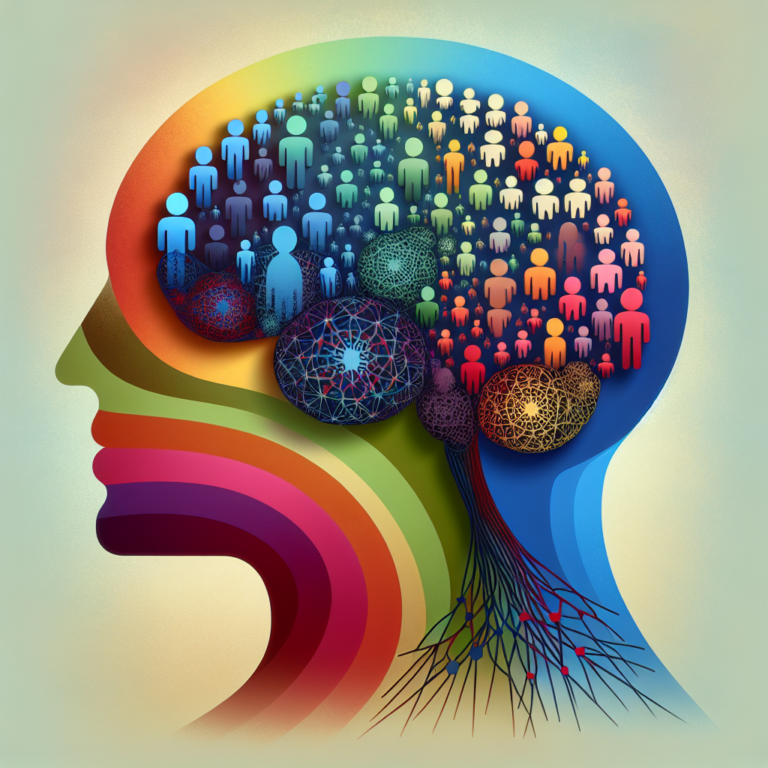
Introduction
As young adults step into the vibrant world of emerging adulthood, they are often greeted with opportunities and adventures. However, this transformative period is also a battleground for mental health that remains largely unseen. The struggle is real for many, navigating academic responsibilities, romantic relationships, career uncertainties, and financial pressures. Understanding the intricacies of mental health in this stage is not just academically significant; it’s crucial for the well-being of the individuals involved.
This comprehensive overview of Mental Health in Emerging Adulthood: The Unseen Struggles aims to shed light on these hidden challenges, inspiring readers to recognize and address them in their own lives or those of others.
Understanding Emerging Adulthood
What is Emerging Adulthood?
Emerging adulthood, typically spanning ages 18 to 29, is characterized by unique developmental tasks and social transitions. This stage involves exploration in various domains, including:
- Identity: Developing a sense of self apart from family.
- Intimacy: Forming deeper relationships.
- Career Exploration: Making decisions about occupational paths.
- Independence: Transitioning into self-sufficiency.
Despite being a time of potential, these tasks are often fraught with anxiety and uncertainty, particularly regarding mental health.
The Emotional Rollercoaster
Emerging adults experience a wide range of emotions due to life changes. For many, anxiety and depression co-occur with these emotional highs and lows, leading to numerous mental health challenges that may go unnoticed.
The Landscape of Mental Health Issues
Prevalence of Mental Health Disorders
Statistical data reveal striking figures:
- Approximately 30% of emerging adults experience mental health disorders.
- Anxiety is the most prevalent disorder, affecting nearly 20% of this age group.
| Disorder | Prevalence (%) |
|---|---|
| Anxiety | 20% |
| Depression | 15% |
| Substance Abuse | 12% |
These statistics underscore the urgent need to address mental health in this life stage.
Case Study: The Invisible Burden
Consider the story of Sarah, a 22-year-old college student who struggled to balance academics and part-time work. Despite seemingly having it all together, she battled severe anxiety that worsened throughout her studies. It wasn’t until she reached out for help that she recognized the mental health struggles she had been ignoring. Sarah’s story illustrates how common but invisible these challenges can be.
Root Causes of Mental Health Struggles
Societal Pressures
Emerging adults are bombarded with societal expectations. The pressure to succeed—academically, romantically, and financially—can lead to feelings of inadequacy, chronic stress, and anxiety. Social media exacerbates these feelings, as it constantly compares individuals to curated, idealized versions of others’ lives.
Identity Crisis
The quest for identity can be tumultuous. Many individuals find themselves questioning their worth or direction in life, leading to self-doubt and mental health issues.
Financial Strain
Student debt and job scarcity contribute significantly to stress levels. Emerging adults often juggle precarious financial situations, which can trigger or exacerbate mental illness.
Recognizing Mental Health Struggles
Symptoms to Watch For
Awareness is the first step in addressing mental health issues. Common symptoms in emerging adults include:
- Difficulty concentrating.
- Changes in appetite or sleep patterns.
- Withdrawal from social activities.
- Irritability or mood swings.
Seeking Help: Overcoming Stigma
Barriers to Treatment
Stigma surrounding mental health can prevent emerging adults from seeking help. They may fear judgment, view seeking help as a sign of weakness, or simply lack knowledge about available resources.
Case Study: Breaking the Barriers
John, a 25-year-old male, initially hesitated to seek therapy due to societal stigma. However, after realizing the impact of his untreated depression on his toxic relationships and performance at work, he opted for counseling. His journey demonstrates that seeking help can be a powerful first step in reclaiming mental health.
Coping Strategies for Emerging Adults
Building Resilience
Resilience can be cultivated through various strategies, such as:
- Mindfulness: Practices like yoga and meditation can enhance emotional regulation.
- Physical Activity: Regular exercise has proven mental health benefits.
- Social Connections: Building a support system is crucial.
Creating a Balanced Lifestyle
Emerging adults should strive for balance, making room for self-care and mental health days. This might include:
- Setting boundaries in social engagements.
- Prioritizing hobbies that bring joy.
- Engaging with mental health resources.
Conclusion
Mental health in emerging adulthood is a profound topic that warrants attention. The unseen struggles faced by young adults—ranging from anxiety and depression to societal pressures—highlight the importance of open discussions around mental health. By recognizing these challenges, seeking help, and building resilience, emerging adults can thrive during this pivotal stage.
FAQs
1. What are common mental health issues in emerging adulthood?
Common issues include anxiety, depression, and substance abuse, often exacerbated by societal pressures and identity crises.
2. How can I recognize if a friend is struggling with mental health?
Watch for signs such as social withdrawal, emotional instability, and changes in behavior. Open the dialogue to encourage them to share.
3. What resources are available for mental health support?
Many universities offer counseling services, and online platforms provide access to therapy. Hotlines and community resources are also invaluable.
4. How can emerging adults cope with stress?
Techniques such as mindfulness, regular exercise, and building robust support networks can effectively manage stress.
5. Why is it important to discuss mental health openly?
Open discussions help reduce stigma, encourage seeking help, and promote understanding and support for those struggling.
Mental health in emerging adulthood is both a critical and complex topic. By understanding the unseen struggles, we can create a supportive environment that fosters well-being and resilience.















What i do not understood is in fact how you’re not actually a lot more well-appreciated than you might be now. You are very intelligent. You realize thus significantly in terms of this matter, made me personally imagine it from so many various angles. Its like women and men aren’t fascinated except it is something to do with Lady gaga! Your personal stuffs nice. Always deal with it up!
Thank you for the auspicious writeup. It in reality used to be a amusement account it. Look complicated to far brought agreeable from you! However, how could we keep up a correspondence?
Thank you, I’ve recently been looking for info about this topic for a long time and yours is the greatest I have found out till now. However, what in regards to the bottom line? Are you certain concerning the supply?
This web page is known as a stroll-by way of for all the information you wished about this and didn’t know who to ask. Glimpse here, and you’ll undoubtedly uncover it.
I’m impressed, I have to say. Really not often do I encounter a weblog that’s each educative and entertaining, and let me inform you, you might have hit the nail on the head. Your concept is excellent; the difficulty is something that not enough people are talking intelligently about. I’m very happy that I stumbled throughout this in my search for one thing regarding this.
WONDERFUL Post.thanks for share..more wait .. …
Hello. magnificent job. I did not anticipate this. This is a great story. Thanks!
Hi! Quick question that’s completely off topic. Do you know how to make your site mobile friendly? My weblog looks weird when viewing from my iphone. I’m trying to find a template or plugin that might be able to correct this problem. If you have any recommendations, please share. Appreciate it!
Some truly nice and utilitarian info on this web site, as well I think the pattern holds good features.
Its like you read my mind! You seem to know so much about this, like you wrote the book in it or something. I think that you could do with a few pics to drive the message home a little bit, but instead of that, this is magnificent blog. An excellent read. I will definitely be back.
This really answered my problem, thank you!
Hi, Neat post. There’s a problem with your website in internet explorer, would check this… IE still is the market leader and a big portion of people will miss your magnificent writing due to this problem.
Oh my goodness! an amazing article dude. Thank you Nevertheless I am experiencing concern with ur rss . Don’t know why Unable to subscribe to it. Is there anybody getting identical rss problem? Anybody who is aware of kindly respond. Thnkx
This is very interesting, You’re a very skilled blogger. I’ve joined your feed and look forward to seeking more of your great post. Also, I’ve shared your web site in my social networks!
Wonderful beat ! I would like to apprentice while you amend your web site, how could i subscribe for a blog site? The account helped me a acceptable deal. I had been tiny bit acquainted of this your broadcast offered bright clear concept
Howdy very nice blog!! Guy .. Beautiful .. Amazing .. I will bookmark your blog and take the feeds also…I’m glad to seek out numerous useful information right here in the put up, we need work out more strategies in this regard, thank you for sharing.
I was recommended this web site by my cousin. I am not sure whether this post is written by him as nobody else know such detailed about my problem. You are wonderful! Thanks!
I truly appreciate this post. I have been looking everywhere for this! Thank goodness I found it on Bing. You’ve made my day! Thanks again
My partner and I absolutely love your blog and find a lot of your post’s to be precisely what I’m looking for. Do you offer guest writers to write content available for you? I wouldn’t mind writing a post or elaborating on many of the subjects you write related to here. Again, awesome weblog!
I’ve been absent for some time, but now I remember why I used to love this web site. Thanks , I¦ll try and check back more often. How frequently you update your site?
Wohh precisely what I was searching for, thankyou for putting up.
Very interesting points you have observed, thankyou for putting up.
Some truly prize posts on this web site, saved to bookmarks.
What i don’t realize is actually how you’re not actually much more well-preferred than you might be right now. You are so intelligent. You recognize thus considerably on the subject of this matter, produced me in my opinion believe it from numerous various angles. Its like women and men aren’t involved unless it’s one thing to accomplish with Girl gaga! Your personal stuffs nice. At all times maintain it up!
I have not checked in here for some time since I thought it was getting boring, but the last several posts are great quality so I guess I’ll add you back to my everyday bloglist. You deserve it my friend 🙂
I just couldn’t go away your site before suggesting that I extremely loved the standard info an individual supply to your guests? Is going to be back regularly in order to inspect new posts
I got what you intend, regards for posting.Woh I am lucky to find this website through google. “Being intelligent is not a felony, but most societies evaluate it as at least a misdemeanor.” by Lazarus Long.
We’re a group of volunteers and opening a new scheme in our community. Your site provided us with useful information to paintings on. You’ve done a formidable task and our entire community might be thankful to you.
Really Appreciate this article, can you make it so I get an email whenever you make a fresh post?
Very interesting information!Perfect just what I was searching for! “Better and ugly face than an ugly mind.” by James.
I’ve been absent for a while, but now I remember why I used to love this blog. Thanks , I will try and check back more frequently. How frequently you update your web site?
I believe this website contains very wonderful indited articles articles.
Great blog! Is your theme custom made or did you download it from somewhere? A design like yours with a few simple adjustements would really make my blog stand out. Please let me know where you got your design. Appreciate it
I have not checked in here for a while since I thought it was getting boring, but the last few posts are good quality so I guess I?¦ll add you back to my everyday bloglist. You deserve it my friend 🙂
This is very interesting, You’re a very skilled blogger. I have joined your rss feed and look forward to seeking more of your fantastic post. Also, I’ve shared your site in my social networks!
I conceive you have observed some very interesting details, regards for the post.
Yeah bookmaking this wasn’t a speculative decision great post! .
Hey very nice site!! Man .. Beautiful .. Amazing .. I will bookmark your site and take the feeds also…I am happy to find numerous useful information here in the post, we need work out more techniques in this regard, thanks for sharing. . . . . .
As a Newbie, I am continuously browsing online for articles that can benefit me. Thank you
I have been browsing on-line more than 3 hours lately, yet I never found any attention-grabbing article like yours. It’s lovely value sufficient for me. In my opinion, if all web owners and bloggers made just right content material as you did, the net shall be much more helpful than ever before. “It’s all right to have butterflies in your stomach. Just get them to fly in formation.” by Dr. Rob Gilbert.
very nice publish, i definitely love this web site, carry on it
I was suggested this web site through my cousin. I’m not certain whether or not this publish is written by way of him as no one else recognize such distinct approximately my difficulty. You are wonderful! Thanks!
Thank you for the good writeup. It in fact was a amusement account it. Look advanced to more added agreeable from you! By the way, how can we communicate?
Hi! This post couldn’t be written any better! Reading this post reminds me of my previous room mate! He always kept chatting about this. I will forward this page to him. Fairly certain he will have a good read. Thanks for sharing!
you’re actually a good webmaster. The website loading pace is incredible. It sort of feels that you’re doing any distinctive trick. Moreover, The contents are masterpiece. you’ve performed a wonderful activity on this topic!
There is obviously a lot to know about this. I believe you made various nice points in features also.
Some genuinely good information, Gladiolus I detected this. “It is only with the heart that one can see rightly what is essential is invisible to the eye.” by Antoine De Saint-Exupery.
I wanted to thank you for this great read!! I definitely enjoying every little bit of it I have you bookmarked to check out new stuff you post…
Hi, just required you to know I he added your site to my Google bookmarks due to your layout. But seriously, I believe your internet site has 1 in the freshest theme I??ve came across. It extremely helps make reading your blog significantly easier.
Real wonderful visual appeal on this web site, I’d value it 10 10.
This design is wicked! You obviously know how to keep a reader entertained. Between your wit and your videos, I was almost moved to start my own blog (well, almost…HaHa!) Great job. I really loved what you had to say, and more than that, how you presented it. Too cool!
There is visibly a bundle to realize about this. I consider you made certain nice points in features also.
I have read a few good stuff here. Definitely worth bookmarking for revisiting. I wonder how much effort you put to create such a fantastic informative web site.
I am often to blogging and i really appreciate your content. The article has really peaks my interest. I am going to bookmark your site and keep checking for new information.
I’m truly enjoying the design and layout of your blog. It’s a very easy on the eyes which makes it much more pleasant for me to come here and visit more often. Did you hire out a designer to create your theme? Outstanding work!
Hey there! I could have sworn I’ve been to this website before but after browsing through some of the post I realized it’s new to me. Anyhow, I’m definitely happy I found it and I’ll be bookmarking and checking back often!
We are a group of volunteers and starting a brand new scheme in our community. Your website offered us with useful information to work on. You’ve performed an impressive job and our entire group can be thankful to you.
You made some decent points there. I did a search on the subject matter and found most individuals will consent with your website.
you are really a good webmaster. The site loading speed is amazing. It seems that you’re doing any unique trick. Also, The contents are masterpiece. you have done a magnificent job on this topic!
I believe this site contains some very excellent information for everyone. “Billy T-T-T-T-Today, Junior” by Billy Madison.
hello!,I like your writing very much! share we communicate more about your article on AOL? I require a specialist on this area to solve my problem. Maybe that’s you! Looking forward to see you.
Yeah bookmaking this wasn’t a high risk decision outstanding post! .